Cheryl: “Fred pulls up his coat and says, ‘He already has.’ I wasn’t there; I’m just telling you what I know.”
Bill: “He was all covered with blood.”
Cheryl: “It was Valentine’s Day. You (Bill) had to radio head office and Anne (Fred’s wife) is at home with the radio on. He lived. He went into the hospital at Fort Saskatchewan.”
Bill: “They opened him up; nothing (vital) was touched. He was in the hospital two days, I think. I hadn’t noticed he was gored, his belt broken because his parka was covering it all up..”
Perry: “What a story!”
Bill: “I could tell stories forever.”
Perry: “What is it about the warden service as you knew it that you would want future generations to know?”
Bill: “Send somebody out with Donny Mickle for a month on the trail and then they would learn how to be a warden. Have you ever seen him turn his foot around? He can stand like this, turn his foot around so his toes are facing backwards.”
Perry: “I won’t ask him to do that because I don’t think I’d like to see it.”
Bill: “The guys that can tell you about the warden service are dead. Alfie’s the last one. Alfie….I have got another story (takes out a photo of Alfie Burstrom, Bob Barker, and himself) We’re heading up to Snaring. We’re all carrying Trapper Nelson packs; ninety pounds. We’re at the West Gate in Jasper here. You take off to the north, go up to Rink’s Shelter: They burned it down a while ago. Dumpleton burned everything.”
Perry: “You must have had a good snowpack to be held up on those snowshoes.”
Bill: “Heck no! Those are 12 by 60’s.There was no trail. That’s Rink’ Shelter (showing a photo).”
Perry: “It’s a cabin.”
Bill: “The only one in that district. From there you head towards Upright or Colonel Pass. That goes over the top [the Continental Divide] and comes out at Adolphus. Before you get there you turn north and head down the Snaring. Four or five miles that Snaring canyon is like Hell. Alfie had been there twice before, once with Clarence Wilkins, and he said, ‘There is no way I will ever go down that Snaring again cause it will get you.’”
Perry: “Would there still be water running at that time of the year?”
Bill: “Oh yes. So anyway we got in there. We were supposed to go up through Eidleen Pass and over the top to Blue Creek. There was a warden there with a skidoo to take us out. Well, we made camp on the Snaring. Here is a picture of it; its below Eidleen Pass. At our camp it snowed about a foot and a half in two to three days. In the mountains you cannot go too fast on account of the snow slides. And Bob had twisted his knee, skiing downhill on the snow-shoes. So Alfie and I left him in camp and went to see if we could get up this pass. Here is one (showing a photo) of the top of the pass. You couldn’t see the ground – it was a whiteout – going through there. We got around the corner and the avalanches were coming down. Alfie said, ‘We have got to go down the Snaring!’ The next morning we got up and we all head down the falls; kind of like Bow Falls. The horse trail’s over here on this side and Alfie says, ‘I think it’s froze up enough we will go down and go on the river’. It will sure make it a lot easier cause on this side we got to go down a bunch of gullies and valleys. We got down that night, made camp. We were sleeping in those mummy bags and I got food poisoning or something. You can’t believe how fast a guy can come out of a mummy bag and into his snowshoes and get around behind the tarp. (Laughter). Alfie wanted to leave me and go get a helicopter. I said, ‘No; I’m okay. I can do it.’ On my Trapper Nelson I always had about three hundred feet of parachute cord wrapped around the top. If we had to cross a river we would tie that. Alfie used that; he was crossing the water on an ice bridge and he jumped on the ice and broke through. He pulled on that string. Bob and I are hanging on thinking he is going down the river. He stuck his head up and laughed – he was standing on the other bank. We got a hundred, two hundred yards from where the Snaring Canyon opened up and there is a ledge about three feet wide along the side covered with ice. We said, ‘Let’s go for it.’ So we went down along there and camped at the bottom. It was McCreadie’s horse camp. The next day – I think it was about four miles to the highway. We went down here, pointing to a photograph; it was straight down so we had to go up on snowshoes. We’re hanging on to trees to climb that sucker. You would get up there to the headwall and get along underneath that and think you have got it made. You’d go about one hundred yards and you can’t get through and you got to go down to that damned river again. And you would go along about one hundred yards and come back up. That’s what we did all day.”
Cheryl: “Did you ever see these in the warden office?” showing Perry a book of John Strachan cartoons? “It’s so good to see these wardens that can draw.”
Blil: ( finishing the story of the snowshoe trip) “We could see the highway but we were too tired to go that last half-mile. So we set up camp and stayed the night.
Bill: You are asking me what did I do: put on fire schools, tested equipment. The biggest bear we had to tranquillize was six hundred and twenty-five pounds. The first fire I was on was up the Amiskwi.”
Perry: “Did that run into the park from outside?”
Bill: “No, It ran from the old Fire Camp to the boundary up to Amiskwi Pass and stopped. If it had went on from there it would have got to Howse Pass and gone on to Saskatchewan River Crossing and been gone. But the wind happened to turn it around. It came back up Amiskwi Pass and laid back over on itself. It burned ten thousand acres about as quick as you could blink. We played with it for about two weeks. We couldn’t get cats; we couldn’t get helicopters; we couldn’t get nothing because it was late. Everything was in the Forestry (Dept). All of a sudden one afternoon that thing decided it had ‘played’ with us long enough. Everything just got right and it blew. The fire ran about seven miles in about twenty minutes. We didn’t realize how close the fire was as we couldn’t see it. We were just at the toe of it when it blew up. We were on a cat fire-line in the bush gathering fire pump hose. Lee (Edwards) was barn boss then. He was helping me. We were about half a mile up the mountain on the East side of Amiskwi fire road. There was another crew on the fire road telling us to get out. As we came back down the fire line there was fire on both sides of us. We just about got caught. Lee was out in front with the horses trying to get the hell out of the way. I was on foot. The fire was coming over the top of us. It was spooky. We just got out. We had a road right there up the Amiskwi, they had logged in there for quite a few years but they never did any cleanup, never burnt any trash. There was about ten feet of trash so when that thing burnt it burnt the ground about ten inches deep. Usually, one or two years after a fire you will get fireweed coming back up. This was five years after. And you couldn’t drink the water out of the Amiskwi River because it was so full of turpentine. The valley runs up like this and over top of Amiskwi Pass and down to the Blaeberry. The lookout tower was on the left side of the valley and the fire. And when that hit the end of the valley it come up and turned. There was a logging site there where they had a staging place. There was a deck of logs there, about thirty, forty feet long each log. They were piled about twenty feet high and one hundred yards long out in this big, open dirt flat. When the fire hit, it created its own fire-storm in there. It started spinning in a circle and the lookout man said he could see actual flames close to two thousand feet above the peaks. Where that pile of logs was there was a hole about twelve to fourteen feet deep. You had to be there. (We start looking at the books of cartoons again. They are copies given to the Walburgers by Bev Hunter; one by (John) Strachan and the other by Bowes).
Cheryl: “Strachan and Bowes, isn’t it? Both wardens. They were probably in the backcountry doing this for something to do. One of them was killed in a car accident.”
Bill: “These boys were in Jasper, around the Brazeau.”
Perry: “They must have had some training because these are really good.”
Cheryl: (reading from a cartoon) “Did you bring your saddle axe?”
Bill: “When you were a park warden nobody touched your axe for fear of dying. I could shave with my axe.”
Cheryl: (pointing to a photograph) “Look at this one. It was from when he joined in ’66. In front of the Palisades with the other guys.” We have shown these (cartoons) to lots of other people; they laugh and think they are cute but they don’t understand them all.”
Bill: “You had to have been there.”
Cheryl: (serving coffee) ‘Cafe Royale’ – it’s a warden thing.”
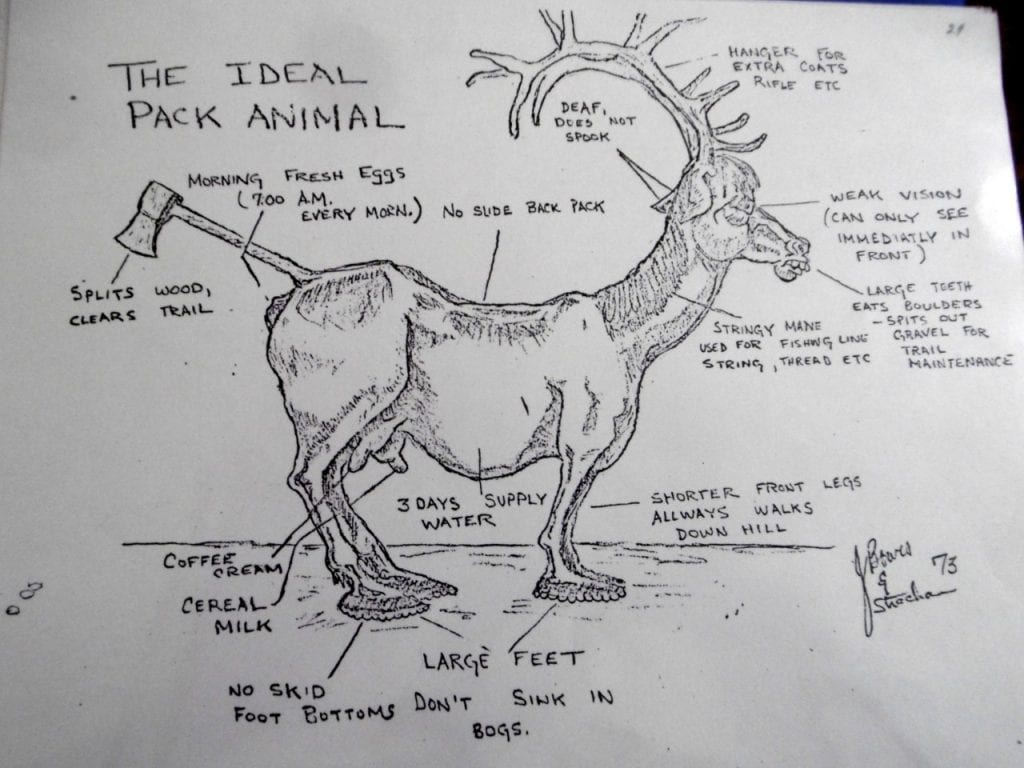
Bill Walburger passed away on March 12th, 2020 at the age of 80 years.
Cartoon by John Strachan
Perry: “Last question – memories: your favourite park, your favourite horse, your favourite cabin, or any other favourites?
Bill: “Everything was a favourite at Blue Creek.”
Cheryl: “Blue Creek was our favourite. That was his district; in Yoho he was on the highway.”
Bill: “My favourite horse, probably King, Major, Gypsy or Sally. Sally was an old Bay mare. That was Cheryl’s horse. I’d go to get on her and she’d think she was some young two-year-old stallion. She was on the run before I could get sitting in the saddle. Come time to go, you’d get all squared away, throw both reins over the horse’s (Sally’s) neck. If I had done that she would have been on the run. Cheryl would get on, pick up the reins, and there she’d go. In the fall when there is a bit of ice on the trail if I was riding her she would slip and slide across it: with Cheryl, she’d back off and go back up in the trees on the moss. That horse just babysat Cheryl. A bunch of horses were killed taking them from Jasper to the ranch one fall. All the old horses that were used on the boundary. They had them in a semi-trailer and got on the wrong road someplace. Went up a hill, spun out, and tipped over in the ditch. The truck driver was out with an axe cutting throats, smashing in heads. Of course, there was broken legs, and all this stuff. So Fred Dixon and I, we went buying horses around Elk Island and bought several horses for the Warden Service from a horse dealer. I could probably name all the horses we had in Yoho. Leon – he was going to be a big stud. He was an R.C.M.P. colt. He didn’t last one or two summers before he got made into a packhorse. Charcoal – he was a nice little horse. He was my favourite in Yoho.”
Cheryl: “Bill joined the Lakeland Rodeo Association when we got to Elk Island. On weekends he would team rope and won buckles.” hat was the end of the interview.
We chatted a while longer while having coffee and looking at the book of Strachan cartoons and a small photo album with all the pictures labeled.
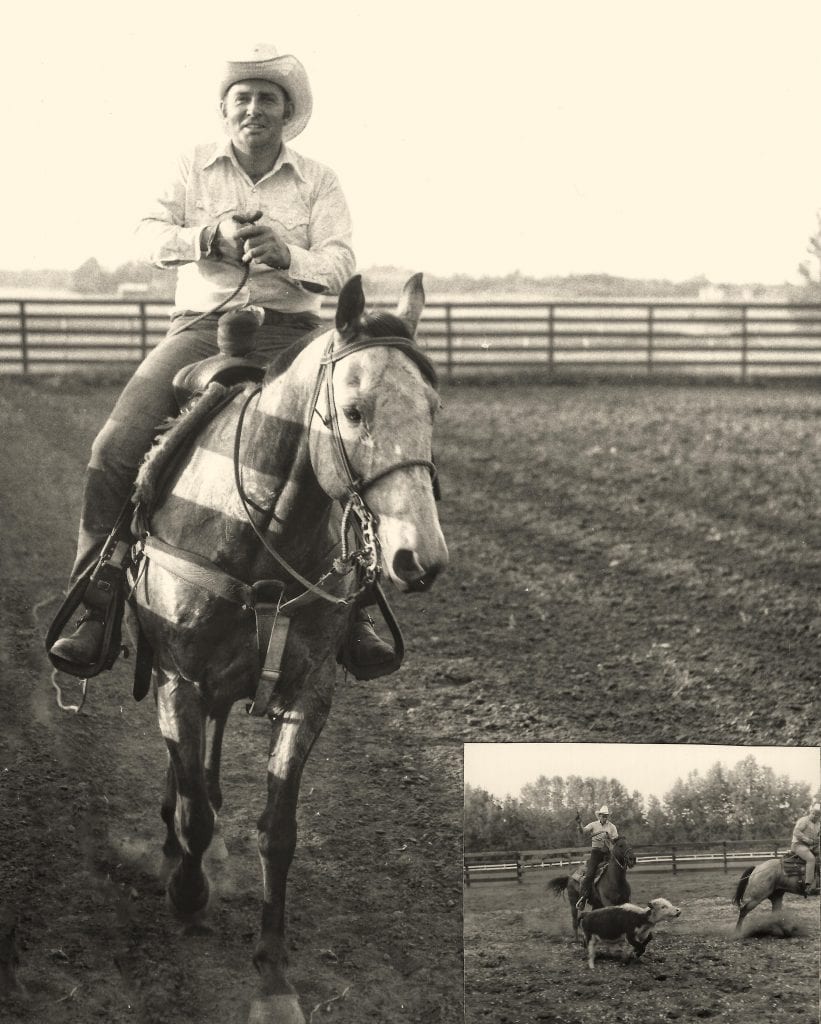
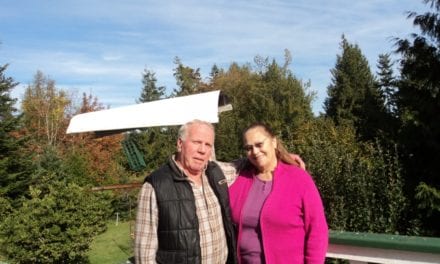
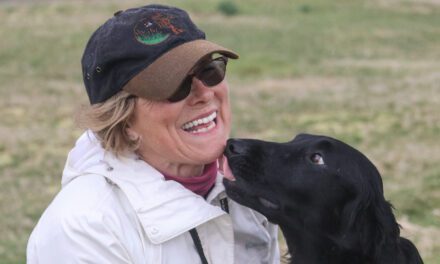
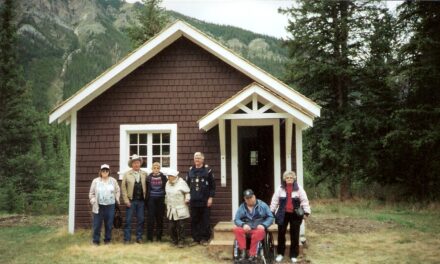
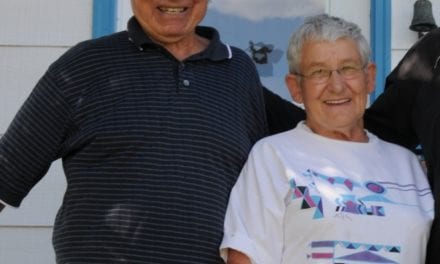
Bill was the first person I worked for when I became a warden in Yoho. But that was only for two weeks before I went to Waterton.
Great writing.
Bill was my mentor and District Warden I worked under in Yoho as a seasonal warden.
Summer of 1973 & 1974.
He was a great person.
Got to meet with him and Cheryl one evening in Magrath.
It had been almost 40 years since we had seen one another.
Called him up on the phone and this some what the way the call went,
” Hello is this Bill walburger?”
“I was when I woke up this morning.”
I introduced myself as a voice from past and spend a couple hours visiting with them.
Miss Bill, he was the real thing.
I only stayed in the warden service as a seasonal from 1972 > 1975.
There was nobody like the originals Hal Shepard Jack Woledge, Gord Rutherford, Dale Portman, Gordon Peyto, etc.
NOTE:E-mail julianrichaud@hotmail.com